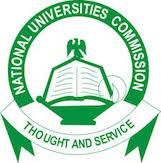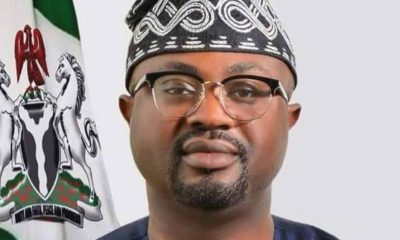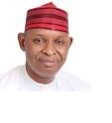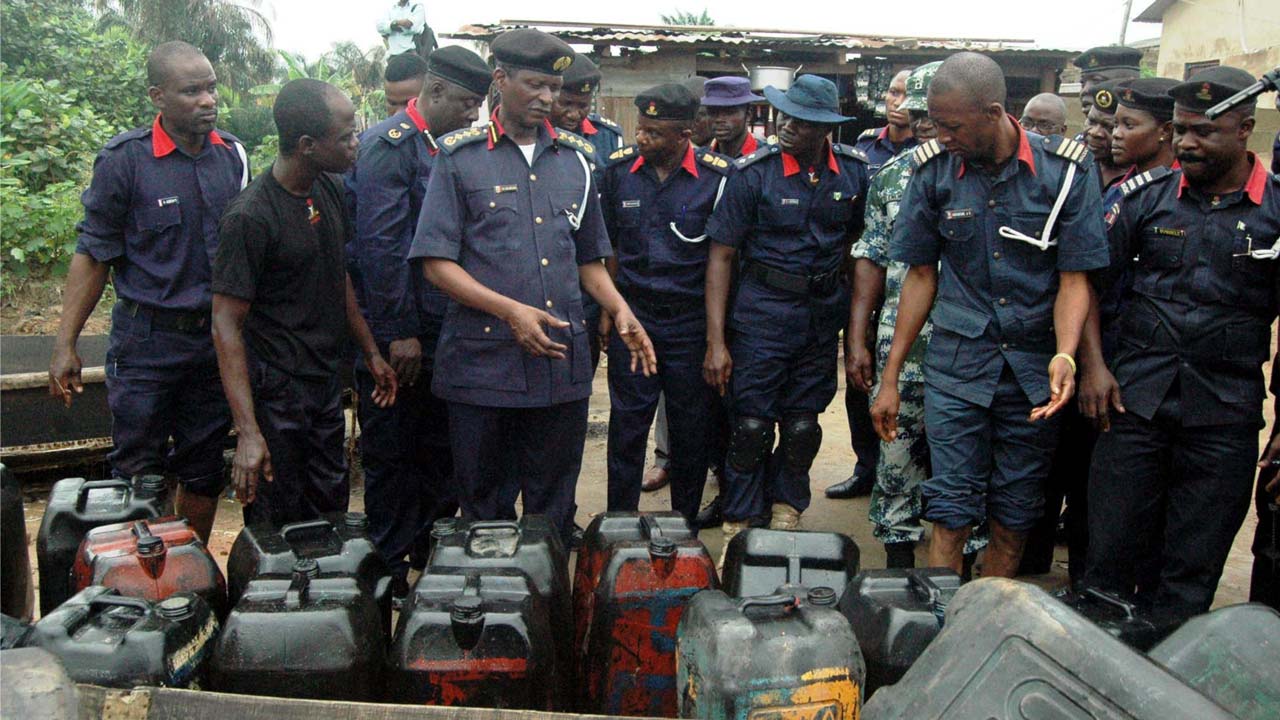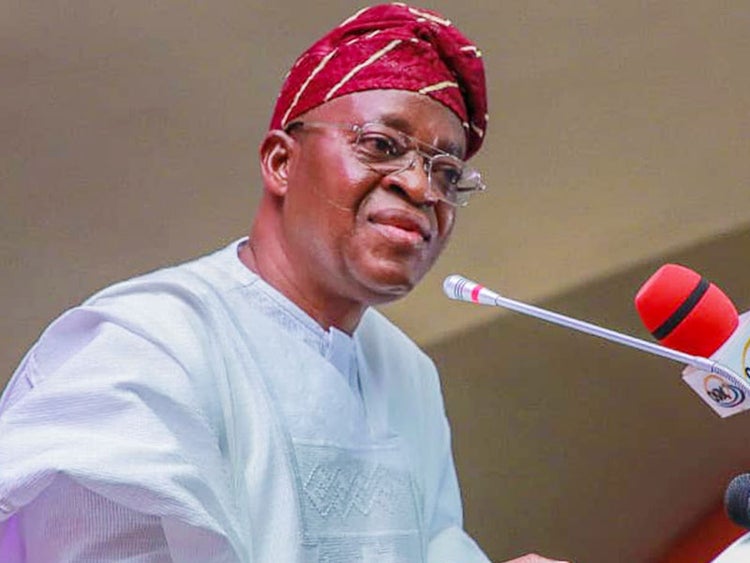OPINION
Fubara: How (not) to Deal with a Political Godfather
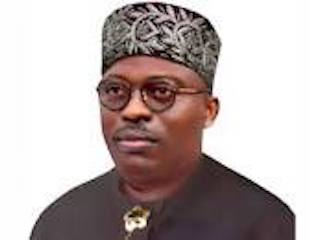
By Agbese Andrew
In the year, 2019, Malam Nasir El-rufai, after winning the governorship election in Kaduna State, declared publicly that he has triumphed over godfatherism by retiring four political godfathers in his state.
It was a claim that resonated with the politics of that period as there were pockets of infighting between those helped into elective positions (godsons) by certain men and women of influence (godfathers).
A proper scrutiny of the claim by El-rufai would however reveal that the then governor, probably excited by his victory, exaggerated the feat he recorded to secure a second term as governor as he did not have a political godfather in the true sense of the word.
Those like Senator Uthman Hunkuyi who made the bogus claim that they were instrumental to his becoming governor and whom he could be referring to, were mere contemporaries who contributed to the process but were not solely responsible for his victory in 2015.
Firstly, El-rufai did not owe his ascendancy to the position in 2015 to any known individual other than the APC tsunami that swept across the northern states and parts of Nigeria. And while one could see the influence of then president Muhammadu Buhari in his securing the APC ticket, the former governor couldn’t have been referring to the then president, as the man had also won his second term at the time.
Those who as governors, had to deal with godfather situations are the likes of Kashim Shettima; Abdullahi Ganduje; Gabriel Suswam; Samuel Ortom; Ibrahim Dankwambo; Abdulfatah Ahmed; Emmanuel Uduaghan, and Emmanuel Udom among others who were helped by their predecessors and want to continue to lord it over them.
El-rufai’s case is also different from those whose godfathers were not their predecessors in office but no doubt responsible for their winning their party’s ticket and being influential to their wins at the general elections. For instance the case of Chris Uba vs Chris Ngige in Anambra State or Olusola Saraki vs Mohammed Lawan in Kwara.
In most cases, the relationship between the godfather and the beneficiary does not end well leading to a gale of rebellion that characterises almost every post election period in Nigeria.
In the 2nd Republic for instance, many governors who made it to office in 1979, fell out with the figures on whose backs they rode to power and consequently lost out in their attempts to return to office.
This was because the godfathers were icons who were really rooted in their domains and truly controlled the votes in their zones and the disagreements were basically on ideology.
A typical example of what a political godfather/godson tussle in Nigeria looks like is the current scenario playing out in Rivers State between immediate past governor, Nyesom Wike and his successor, Mr. Siminalayi Fubara.
In this case, there is clearly the one who sees himself as solely responsible for the election of the other and wants to continue to dictate the pace and style of governance and the one who knows that he was helped but is not willing to share or surrender power.
Unlike the 2nd Republic and pre-1999 scenarios, former governors have come to assume the roles of godfathers for merely helping to install their successors.
But unlike the likes of Shettima, Udom, Dankwambo and others, where their predecessors on leaving office, were out of the power equation, Fubara, has to deal with a bigger problem because his godfather is occupying a very important office as minister of the Federal Capital Territory.
This has become a source of worry for governors when between 1999 and 2007 a trend evolved where persons were ministers by the ruling party purely for the purpose of taking over the political structures of states from governors who are members of other parties.
John Kadiya, who was the first minister of FCT may not have been appointed by Shehu Shagari to fight then governor of Plateau State, Solomon Lar, but his attempt to dislodge the latter in 1983 and his impressive showing at the polls may have shown the light on how to empower ministers to snatch an ‘errant’ state and bring it under the fold of a ruling party.
Under President Olusegun Obasanjo this almost became an official policy of government and since then, every minister began to see himself as being on a mission for the number one office in his state.
Between 1999 and 2003, many of Obasanjo’s ministers challenged the governors of their respective states. They include Danjuma Goje, Olusegun Agagu and Damishi Sango.
Now Fubara, has to deal with not just having a predecessor as godfather who wants to continue to control things in the state but one who by virtue of his being a minister can dispense favours to attract the loyalty to maintain and recruit foot soldiers.
So far, there are no text book recommended measures on how to defeat godfathers as even El-rufai, the self acclaimed demolisher of godfatherism did not offer much in that regard other than recommending a study of the voters register and working on those who fail to turn up for elections.
Nonetheless, with the benefit of hindsight, one can draw a lesson or two from the experiences of others.
And as my uncle, Prof. Pita Agbese would say in Jamaican patwa, Come with I.
Two options are usually opened to a governor being harangued by his benefactor and they are 1) to either submit totally to the puppeteer or 2) to resist, fight and cut the puppet strings.
Either way, there are consequences and the choice of an option depends on how formidable the godfather is and the extent the godson is willing to go in upending the former.
Total submission has worked for some, but it certainly did not favour others.
For instance even with the100 percent loyalty that Abdulfatah Ahmed of Kwara gave his godfather while in office, it did not favour him at the end as he was not considered worthy for the senatorial ticket of his party when his tenure as governor expired.
Emmanuel Uduaghan of Delta too did not fare well even after totally submitting to his predecessor as he did not succeed in choosing his successor and could not even win election to the Senate.
In the same manner, Ambode did not get a second term even when he had enough reasons to call the bluff of his godfather when it was clear that he was not favored for a second term but preferred to go down without resistance.
But total submission has worked for some. It has for instance worked for Babajide Sanwo-Olu and to some extent Abdulfatah who got second terms on the strength of the backing of their godfathers.
If Fubara however wishes to toe the line of submission he would do better to understudy how Mai Mala Buni of Yobe and Douye Diri of Bayelsa have remained loyal to their godfathers without rancour.
The case of Babagana Zulum stands out as his godfather, the current vice president has promised as a matter of principle not to interfere in his government and has kept to his word.
The other option of returning fire for fire and fighting the godfather on the hand appears more challenging but has resulted in fewer casualties.
In the current dispensation, so far, it is only Mohammed Lawan of Kwara, Mala Kachalla of Borno; Aliu Akwe Doma of Nasarawa and Umaru Shinkafi of Zamfara, who took their godfathers headlong that did not succeed in getting second terms.
But, Ibrahim Dankwambo of Gombe confronted and shook away the grip of his godfather predecessor and succeeded. Same with Gabriel Suswam and Ortom of Benue; Theodore Orji of Abia, Godswill Akpabio and Emmanuel Udom of Akwa Ibom; Kashim Shettima of Borno; Sullivan Chime of Enugu, Abdullahi Ganduje of Kano etc
For Fubara, it is obvious that he does not have an option other than the second option if he wants to remain relevant as governor as Wike has shown that he is not the type who will allow his political son breathe in any type of air he fancies.
With reports that he was the one that made major appointments in Fubara’s cabinet, Wike has shown that he wants to be the one to dictate what happens at the Brick House.
Certainly no leader worth his salt would take that and that is where Fubara would need to learn from the experiences of others before him.
From the experience of others, the first mistake Fubara did was allowing
Wike take the FCT ministry which is categorised as one of the powerful and juicy ministries.
Realizing how powerful ministers could be, governors have since devised means of checkmating those so appointed in their domains to forestall the possibility of ‘coups’ against them, one of which is to insist the ministerial position is given to their trusted nominees.
In cases where the governor has no influence over who is appointed minister from his state, he tries to mitigate the threat by lobbying for the nominee to be given a not so juicy and inconsequential portfolio.
While there was no way Fubara would have stopped Wike from becoming a minister or stop his lobby for a juicy portfolio, he could have cashed in on the sentiment calling for his redeployment to another ministry by a section of the country at a time.
His support to the cause would have given it more substance other than the leg of religion which it stood on.
The second mistake was to have remained on the defensive for long.
Knowing the type of person Wike is, Fubara should have moved quickly to checkmate the former governor by opening a probe of his administration.
Since the minister has been oscillating between two major parties, getting his ward to take an action on him whether it succeeds or not would have served to distract him and watered down his plot.
It was because Fubara failed to be on the offensive that Wike is now dictating the nature of the conflict and putting him on the defensive.
All the actions Fubara has taken so far like demolishing the house of assembly complex, getting an order recognizing his man as speaker of the state assembly are mere reactions to Wike’s onslaught which shouldn’t be.
He needs to be more proactive as Wike does not take prisoners.
But it is important that as the political fight is going on, Fubara should not lose sight of governance.
It will serve him well to just as Dankwambo did before a major crisis would erupt between him and his godfather, mobilise to win the hearts of his people with projects; construction works, clearing, any backlog of pension or salaries if any, provide employment and embark on people oriented programmes.
His flagging off the twenty thousand (20,000) housing units for low-income earners in the State, along the Obiri -Ikwerre- International Airport road on Friday is a good idea.
In all, I’ll advise him to befriend Dankwambo, his professional colleague (they’re both accountants) to learn how to shake the grip of godfathers at a very early stage.
Perspective
Democracy Day Speech By Benue Governor, Ali
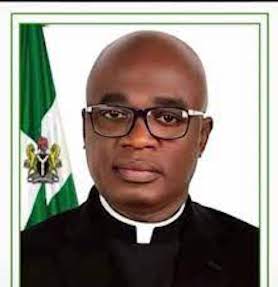
SPEECH BY HIS EXCELLENCY REV. FR. DR. HYACINTH IORMEM ALIA, THE EXECUTIVE GOVERNOR OF BENUE STATE, DURING THE OCCASION OF DEMOCRACY DAY CELEBRATION, HELD AT THE IBB SQUARE, MAKURDI, ON WEDNESDAY JUNE 12, 2024
My great people of Benue,
2.I am excited to join you today to mark 25 years of uninterrupted civil administration in our dear country – Nigeria.
3.
This day affords us the privilege not just to merely mark the passage of time, but to celebrate all our past and present heroes of democracy; as well as reflect on our democratic journey in the state so far, particularly in the last one year prior to which your unanimous voices at the polls culminated into my emergence as your governor.4.Exactly two weeks ago, being May 29, 2024, made it exactly one year since I took the oath of office. However, I deliberately postponed my speech on that day so as to coincide with this year’s Democracy Day celebration.
5.I considered it more appropriate to use today’s celebrations to give you a brief but articulate account of my stewardship in the last one year; as well as point to the bright path that leads to a greater Benue which we all aspire for, as a government and as a people.
6.Over a year ago, I stood here and made lofty but achievable promises to you. These promises, enshrined in our 7-point agenda, ranged from economic growth, to infrastructural development, security of lives and property, prompt payment of salaries and pensions/gratuities, amongst others.
7.Upon assumption of office, we met Benue in an economic ditch. We immediately hit the ground running by engendering economic growth through agriculture. Accordingly, we procured100 trucks of fertilizer which was distributed to farmers at subsidized rates. The impact so far has been tremendous.
8.Beyond provision of fertilizers, we also approved counterpart funding for International Fund for Agricultural Development (IFAD’s) Value Chain Development Programme in eight local government areas, with a view to enhancing rice and cassava production.
9.We further established collaborations with agricultural input suppliers to ensure the availability of improved seeds and seedlings. This was coupled with our reactivation of the swine/crop integrated project in Yandev, Gboko Local Government Area, through partnership with the French Development Agency to advance agricultural skills, as well as renovation of the infrastructure to boost enhance productivity.
10.Furthermore, we have struck a Public-Private Partnership (PPP) deal with Star Fertilizer Company Limited, in order to revive the state-owned fertilizer blending plant. This is in addition to our kick-starting of phased development of the Ikyogen Cattle Ranch.
11.Meanwhile, plans are in top gear towards dredging the River Benue, as a catalyst for boosting agricultural activities and easy movement of agricultural products.
12.Furthermore, just last week, I handed over 33 new tractors and the sum of 380 Million Naira to community interest groups across the state, to undertake climate-smart agricultural activitiesunder the Community Revolving Fund (CRF) scheme of the Agro-Climatic Resilience in Semi-Arid Landscapes (ACReSAL).
13.I assure you that my administration is more than committed to improving the livelihoods of all and sundry in the state, especially through agriculture.
14.With regards to Economy and Wealth Creation, our administration has created 1,450 ad-hoc jobs for the Nigeria Fire Extinguishers Control, with plans for permanent integration into the Federal Fire Service.
15.We are currently setting up a multifunctional fashion hub in collaboration with the Office of the Vice President, to benefit over 250 professionals in the industry.
16.In a similar vein, with 34 out of Nigeria’s 46 solid mineral deposits in Benue, we are on the verge of becoming a mining powerhouse. In view, we have partnered with Sound Core to clean up and develop the mining sector, projecting 3.5 billion Naira in revenue through our annual surface rent scheme.
17.While tackling illegal mining and educating communities on the legal benefits, our administration in collaboration with the Federal Government, has formed the Mineral Resource and Environmental Management Committee, to protect resources and manage community conflicts.
18.Meanwhile, we have revitalized government assets, including the Benue Investment and Property Company (BIPC) Kaduna Plaza, as well as the Guest Houses in Kaduna and Makurdi towns respectively. While transitioning to digital operations for better service delivery, we have also commissioned a BIPC bakery and water factory, and launched the Emperor Fertilizer and Motorcycle Hire Scheme, all domiciled in the State.
19.My esteemed people of Benue, as you recall, when we came on board, our industries were moribund, with many on the brink of being taken over by private hands. We however, said a firm ‘no’ to the glorified wisdom of the last administration that “Government has no business in doing business”.
20.Today, I proudly inform you that we have initiated the re-establishment and resuscitation of these industries, including Benue Breweries, Taraku Oil Mills, amongst others. This aims at creating more job opportunities for our teeming youths, as well as improving our Internally Generated Revenue (IGR).
21.In the area of infrastructure and environment, in the bid to enhance movement of people, goods and services, we commenced the construction of 16 strategic roads in Makurdi and other parts of the State, particularly linking our rural communities. 98% of these roads have been completed, while others are still under construction.
22.In total, our administration has awarded 51 road projects within just one year, including three underpass projects in Makurdi, Gboko, and Otukpo Local Government Areas, respectively.
23.In addition, the ‘Light Up Makurdi’ project, extending from Agan Toll Gate to the Air Force Base and other parts of Makurdi, is now a reality and will be expanded to other parts of the State as we step into another year of our tenure.
24.We have also renovated and furnished the State Secretariat. We have reconstructed the Benue State House of Assembly Complex, and remodeled the Assembly Clinic.
25.In the transport sector, the rejuvenation of the state-owned Benue Links Transport Company is another milestone. We have handed 100 new buses to the Company, and subsidized the cost of transportation. We have also upgraded the Company’s headquarters to meet global best standards.
26.In health and social development, our administration was the first in Nigeria to implement the Revised Medical Residency Training Fund (MRTF) 2023, at the revised rate.
27.We also re-introduced the Bond Scheme for medical students of Benue origin studying medicine, by approving the monthly payment of N103,000 per student. This is coupled with the approval of N100,000 monthly allowances for doctor-corps members serving in the State; as well as N15,000 as monthly allowances for other corps members posted here.
28.Meanwhile, we have overhauled the Benue State University Teaching Hospital to meet international standards. We have also employed 500 new staff on merit, to augment the workforce.
29.Our administration has also commenced full clinical services at the Muhammadu Buhari Mother and Child Hospital, Makurdi, to reduce maternal mortality and offer free medical services to women and children under the age of five. Meanwhile, plans are underway to ensure an effective primary healthcare delivery system in the state.
30.In the aspect of security of lives and property, one of our most prioritized missions has been to ensure that our people, who have been displaced by marauders, can return safely to their ancestral homes. We have therefore initiated the process by lobbying the Federal Government to begin the construction of resettlement homes for our people.
31.More so, our administration, in collaboration with security agencies and relevant stakeholders, has been working round the clock to ensure that Benue is a safe haven for all.
32.Although this task has been challenging, the impact so far has been very encouraging. For instance, we have nipped in the bud almost all the inter-ethnic/community skirmishes that were prevalent before and after we came into office.
33.Also, farmer/herder crisis and militia attacks have been contained through both kinetic and non-kinetic approaches. And we are determined to lose no sleep until we totally secure our dear State.
34.We have also signed into law, the establishment of a state security outfit known as the Benue State Civil Protection Guards: A formidable force combining our Livestock Guards and Volunteer Guards to effectively tackle insecurity in our dear state.
35. My good people of Benue, make no mistakes about the misinformation making the rounds that the Anti-open Grazing Law has been repealed. As a matter of fact, the Law has been strengthened with more stringent stipulations.
36.Let me use this opportunity to salute all security agencies and formations domiciled in the state, for their priceless sacrifices towards the protection of lives and property. To all volunteers of information, logistics and other efforts towards securing Benue, we are truly grateful.
37.In the education sector, our administration has made great strides towards repositioning it, right from the primary to tertiary level.
38.For instance, as part of palliatives for the removal of fuel subsidy, our administration decided to pay for the 2023/2024 examination fees of all students in government approved public secondary schools in the state sitting for the West African Examination Council (WAEC), National Examination Council (NECO), and National Business and Technical Examinations Board (NABTEB) examinations, respectively.
39.At the Benue State University, we have expanded academic programmes, established new faculties, restored scholarships for medical students, and paid outstanding salary arrears. We have upgraded the ICT facilities, preparing over 10,000 youths for the global market. The idea is to train over 60,000 youths.
40.As a proof of our zeal towards re-writing the narrative of the education sector in Benue, we allocated 15% of the 2024 budget to education, surpassing the 7% at the Federal level. We have also trained over 150 headteachers, and distributed over 100,000 instructional materials across public schools in the state to enhance teaching and learning.
41.This is coupled with the establishment of the Benue State Education Quality Assurance Agency (BEQA), saddled with the responsibility of daily monitoring and evaluation of all schools across the State, with the aim of improving the standard and qualityof education, as well as reawakening teachers and staff to their responsibilities.
42. This has so far yielded huge results, notably being the recent clinching of an international debate trophy in Indonesia, by four Benue secondary school students who represented Nigeria.
43.Benue under my watch, has also weeded out thousands of ghost workers, ghost schools, and ghost agencies out of our payroll. We have gone further to cut off all leakages and conduits of inefficient money consuming channels obtainable in the past.
44.Let it be on record that our administration has borrowed no dime since we came on board. And we shall only do so only when it becomes extremely necessary. Prudence in governance must know us and call us by name.
45.Meanwhile, it is no longer news that improved staff welfare, prompt payment of salaries and pensions/gratuities, as well as arrears, is now a mainstay under my watch. And so shall it continue to be.
46.Fellow Benue citizens, I can go on and on for hours, giving you a factual account of our achievements, your achievements in the last one year. However, for want of time, I have only drawn up this summary of our journey so far.
47.I reserve special thanks to all members of my team for their unsung sacrifices in the quest for a better Benue; and to all of you for your support and belief in us.
48.As a government of popular consent, I am mindful of the honour and trust bestowed on me. For this, I have pushed sleep and comfort to the backseat to ensure that I live up to the expectations and terms of our social contract.
49.Throughout this period, I have earned nothing close to love from those whose selfish interests I step upon to bring you comfort, happiness, and succour. But too high I place your interest above theirs, hence I have no regrets for what I have lost in the cause of this journey.
50.As we mark Democracy Day celebrations, I hereby restate my commitment towards re-writing the socio-economic narrative of our dear state.
51.I am forever committed to building formidable systems and institutions premised on fairness, accountability, democratic ethos, equity and justice; systems that are bigger and stronger than individuals including my humble self.
52.I am counting on your continued support to our administration, so that together, we can reposition Benue on the global map.
53.My vow is to always stand with you, by you, and always for you.
54.Thank you, and God bless!
Business Analysis
The Imperative of CBN’s Autonomy

By Ibrahim Modibbo
Under globalization and multi-cultural settings such as ours, Nigerians are under no illusion to the enormity of the myriad of challenges confronting the President Bola Tinubu Administration. In my opinion, anxiety and trepidation seems to trial the move by the National Assembly, to amend the provisions of the CBN Act of 2007.
Industry watchers and members of the banking community fear that the attempt to amend the Act will erode confidence in the apex bank, have a negative impact on the banking industry and ultimately, affect the nation’s economy.In the dynamic landscape of global economics, the independence of central banks stands as a cornerstone for maintaining sound macroeconomic stability and fostering confidence in financial markets.
Across all major world economies, from the United States of America, United Kingdom, the developed Asian economies to the European Union, this principle is upheld as a vital aspect of prudent economic management. However, recent proposed amendments to the Central Bank of Nigeria (CBN) Act by the Nigerian Senate threaten to erode this independence or autonomy, putting Nigeria at odds with global best practices and jeopardizing its economic stability going forward. In this piece, we shall examine the critical reasons why preserving the autonomy of the CBN is imperative for Nigeria’s economic future.It is crucial that we fully understand and appreciate the significance of maintaining the Central Bank’s independence. An independent central bank is critical for ensuring that monetary policy is conducted without political interference. This autonomy allows central banks to implement policies that focus on long-term economic health, such as controlling inflation, stabilizing the currency, and promoting sustainable economic growth. In major economies, central bank independence has been instrumental in achieving these goals. The Federal Reserve in the United States, the European Central Bank, and the Bank of England all operate independently of their respective governments, ensuring that monetary policy decisions are based on available economic data and analysis rather than political whims.
While commendably the idea of the proposed amendments to the CBN Act aim to enhance compliance and strengthen corporate governance, some of the key aspects pose significant threats to the bank’s autonomy. One of such proposal is the creation of a Coordinating Committee for Monetary and Fiscal Policies. This committee, dominated by fiscal authorities including the Ministry of Finance, would have a considerable influence on monetary policy decisions. Such an arrangement risks subordinating monetary policy to fiscal objectives, undermining the CBN’s ability to achieve its primary mandate of price stability in the economy. Apparently, this is a step in the wrong direction in the management of the Nigerian economy.
Fiscal policy, which is the cardinal responsibility or primary function of the Ministry of Finance, encompasses a range of activities related to government spending and taxation. This policy area involves the allocation of government resources, management of public funds, and implementation of tax regulations, all aimed at influencing the country’s economic conditions positively. While the effective coordination between fiscal and monetary policy is desirable, giving fiscal authorities dominance over the CBN compromises the bank’s ability to act independently. This fiscal dominance could lead to short-term policy decisions that prioritize immediate fiscal needs over long-term economic stability. For instance, the government might pressure the CBN to keep interest rates artificially low to reduce borrowing costs, even if such a policy could lead to higher inflation and other economic vulnerabilities.
Another alarming aspect of the current amendment process at the hallowed precincts of the Nigerian Senate pertains to the insistence on subjecting the Central Bank of Nigeria’s yearly budget to approval by the National Assembly. This proposed measure raises significant apprehensions regarding the potential politicization and interference in the operations of the Central Bank of Nigeria. The approval process could result in undue delays of monetary policy decisions, hindering the CBN’s ability to respond swiftly and effectively to economic challenges. In an environment where rapid decision-making is often essential, this could prove detrimental to Nigeria’s economic health.
Global best practices emphasize the need for central bank independence to ensure economic stability and investor confidence. Across the world today, major and emerging economies adopt this framework to ensure a situation of a more stable and predictable economic environments. For Nigeria to diverge from this path would not only isolate it from the global business community but also undermine investor confidence, leading to potential capital flight, increased borrowing costs from multilateral institutions, and a general loss of economic credibility as well as downward grading by global rating organizations.
The proposed amendments, particularly the inclusion of the Coordinating Committee for Monetary and Fiscal Policies, represent a concerning shift towards fiscal dominance. This committee’s role in determining interest rates on the CBN’s temporary advances to the federal government is especially problematic. With the committee chaired by the Minister of Finance as proposed in the current amendment and ostensibly dominated by fiscal authorities, there is a clear conflict of interest. Such a structure inherently favors fiscal objectives over monetary prudence, jeopardizing the delicate balance and the thin line required for sound macroeconomic management. The CBN should rather be encouraged to foster effective prudential guidelines in management of its advances to the federal government as enshrined in the current Act.
The potential for political interference in the CBN’s operations extends beyond the management of the monetary policy. It threatens the very fabric of Nigeria’s economic governance. An autonomous central bank acts as a check on government excesses, ensuring that fiscal policy does not compromise long-term economic stability. By undermining the institutional and operational autonomy, the proposed amendments risk eroding this safeguard and shield, potentially leading to economic policies driven by political rather than economic considerations.
While the Nigerian Senate’s intentions to amend the CBN Act may stem from a desire to enhance governance and performance by the apex, the proposed measures threaten to undermine the very foundation of effective economic management. Eroding the CBN’s autonomy not only contradicts global best practices but also risks plunging Nigeria into a cycle of political interference and economic quagmire.
It is therefore imperative that the Senate reconsider some key aspects of these amendments as enunciated here, preserving the CBN’s independence as a cornerstone of Nigeria’s economic policy framework. Only by doing so can Nigeria ensure a stable, predictable, and resilient economic future, in line with global standards and best practices. The nation’s economic health and international standing depend on it.
While admitting that some of the proposed amendments to the CBN Act are commendable as they are designed to entrench the culture of compliance, strengthen corporate governance, and reposition the apex bank for improved performance in attaining its mandate, most analysts however, say some of the major proposed amendments to the CBN Act appear to erode the bank’s autonomy and weaken the independence of monetary policy, at variance with international best practices.
For example, the proposed coordinating committee for monetary and fiscal policies concerning monetary policy in their opinion will undermine the apex bank’s independence and capacity in achieving its price stability mandate, including fiscal and monetary policy coordination as well as undermining the CBN’s operational independence and weaken the apex bank’s flexibility in deploying appropriate policy frameworks in a dynamic economic environment to achieving its core mandate.
Similarly, the proposed amendment to the CBN Act by the lawmakers will promote undue political interference in purely economic matters, as the fiscal authority would dominate the proposed committee’s membership and chairmanship. Subjecting the CBN’s budget to National Assembly approval will also undermine its institutional autonomy and introduce the potential for political interference in monetary policy which could lead to significant delays in monetary policy implementation and hinder swift monetary policy responses with potential negative implications for macro-economic stability.
According to Dr. Williams Puye an economic and financial expert, some of the proposed amendments threaten the independence and operational autonomy of the CBN as the country’s monetary authority. He asserted that the inclusion of the coordinating committee for monetary and fiscal policies in determining the rates of interest on the apex bank’s temporary advances to the federal government will not only erode the bank’s operational autonomy, but also breed conflict of interest since the committee is chaired by the minister and dominated by fiscal actors.
The now controversial amendment bill to the CBN Act is sponsored by Senator Mukhail Adetokunbo Abiru and co-sponsored by all 41 senators of the Senate Committee on Banking, Insurance and other Financial Institutions and proposes the establishment of a 7-member coordinating committee for monetary and fiscal policies to be chaired by the minister of finance, to among other things set internally consistent targets of monetary and fiscal policies that are conducive to controlling inflation and promoting financial conditions for sustainable economic growth.
It sets the tenure of the CBN Governor and Deputy Governors at a single non-renewable term of six years, appointment of a minimum of one career staff of the bank in the committee of governors, the appointment of at least one female among the External Directors as a Board member, that the five external directors should hold office for a non-renewable term of five years (one year less than the six-year tenure of the governor and deputy governors.
The amendment further proposes the establishment of the position of chief compliance officer in the rank of a Deputy governor, who reports directly to the Board and may occasionally be summoned to appear before the relevant committee of the National Assembly, limit temporary advances to the federal government, including modalities for the issuance of new legal tender to replace existing ones, providing that the withdrawal of the old legal tender should be carried out in phases and in a manner that does not cause any distortion to economic activities, while the apex bank should be in possession of sufficient new currency, not less than 70 percent of the old stock of currency to be withdrawn before embarking on such a programme.
In the area of Board governance, based on the fact that the CBN governor also serves as the Board chairman, the bill proposes that the board committees should be headed by non-executive directors instead of the deputy governors. The bill further proposes to amend the paid-up capital of CBN to N1trillion and that this figure may be increased from time to time by such amount as the government may approve either by way of transfers from the general reserve fund or by such other means as the government, in consultation with the board may approve.
Another notable provision of the bill states that the CBN governor must appears on a semi-annual basis whilst the National Assembly in the exercise of its constitutional duties should reserve the power to invite the governor to make presentations from time to time as the need arises. It also proposes the publishing of a monetary policy report and an interim financial report every six months that should be submitted to the president and the National Assembly within one month of the reference period.
It adds that where the governor fails to make a report to the president and the National Assembly as required by law, he shall be served with a warning letter by the National Assembly and if the failure persists, by a recommendation from the National Assembly for the governor’s suspension from office by the president.
Most significantly, the bill proposes that the budget approved by the CBN board can only be implemented upon the consideration and approval of the relevant committees of the National Assembly.
It goes without saying that safeguarding the independence of the Central Bank of Nigeria is crucial for maintaining the country’s overall economic stability and fostering investor confidence with a good mix of monetary policy tools. The proposed amendments to the CBN Act, particularly those that threaten the bank’s autonomy, must be reconsidered to ensure Nigeria’s economic future remains secure and safe. The Nigerian Senate must be careful not to exacerbate the current economic woes in the country. Hence, by upholding the principle of central bank independence, Nigeria can align itself with global best practices and ensure a stable and prosperous economic environment for its citizens now and in the future.
Dr. Modibbo is an Abuja based Journalist & Commentator on National Issues
OPINION
Nemesis as Shord Distance Runner








